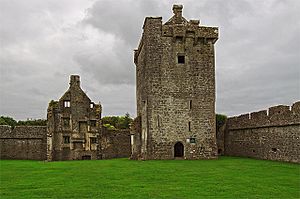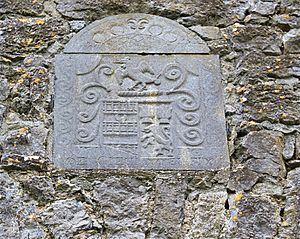Pallas Castle facts for kids
Quick facts for kids Pallas Castle |
|
|---|---|
| Native name Irish: Caisleán na Pailíse |
|
 |
|
| Type | tower house |
| Location | Pallas, Tynagh, County Galway, Ireland |
| Built | c. 1500 |
| Owner | State |
| Official name: Pallas Castle | |
| Reference no. | 462 |
| Lua error in Module:Location_map at line 420: attempt to index field 'wikibase' (a nil value). | |
Pallas Castle is an old, strong building called a tower house. It is also a National Monument, which means it's a very important historical site in County Galway, Ireland.
Contents
Where is Pallas Castle?
Pallas Castle stands west of Pallas House. It is about 2.8 kilometers (1.7 miles) south of Tynagh. You can find it about 1.6 kilometers (1 mile) north of the Duniry River.
A Look at Pallas Castle's History
Who Built Pallas Castle?
The powerful Burke family built Pallas Castle around the year 1500. It was a strong home for them.
Owners Through Time
In 1574, a man named Jonyck Fitzthomas Burke owned the castle. Later, after a time called the "Restoration" in Ireland, the castle went to the Nugent family. They were the Earls of Westmeath.
Other Buildings Around the Castle
Near the main tower, you can see other old buildings. There is a rectangular "flanker" (a defensive part) and a malt house from the 1700s. A large gabled house from the 1600s also has remains nearby. Some buildings in the southwest corner might be from the 1800s. The Burke family name is still important in the area today. Many descendants live close by.
Inside Pallas Castle
Castle Structure
The main tower of Pallas Castle is five stories tall. The third floor has a special arched ceiling called a vault. The very thick end wall of the castle has hidden rooms and a winding staircase inside it.
Special Features
You can still see several well-preserved fireplaces on different floors. These were used to keep the castle warm. The fourth floor has beautiful windows with stone dividers called mullions. These windows are framed by arches.
The Roof and Bawn
In the early 1900s, the castle's roof was still covered with thatch (straw or reeds). The bottom part of the roof was covered with stone flags to protect it.
The tower is surrounded by a well-kept wall called a bawn. You enter the bawn through a two-story gatehouse. The bawn also has two smaller towers with turrets at each corner. Inside, there are steps and protective walls called parapets.
 | Calvin Brent |
 | Walter T. Bailey |
 | Martha Cassell Thompson |
 | Alberta Jeannette Cassell |


